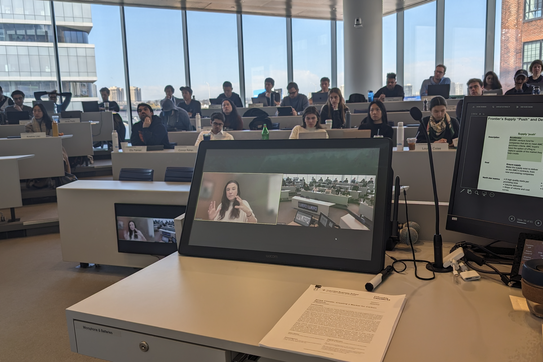Why would Stripe, Inc.—the producer of payment-processing software for businesses large and small—have anything to do with funding cutting-edge solutions for the removal of climate-change-causing carbon dioxide?
It's a fair question, acknowledges Gernot Wagner, a climate economist and senior lecturer in the economics division at CBS. And it was in large part because of this understandable (and common) sense of dissonance that Wagner invited to his policy class Nan Ransohoff, head of Stripe Climate.
In short, Stripe is building up its capacities to take on climate change for many of the same reasons CBS is, too: because the need to fend off the devastating effects of a changing climate is a critical strategic imperative for any business that hopes to operate many decades into the future.
At CBS, core class curricula are increasingly integrating lessons and case studies that ask students to think critically about the challenges that climate change presents to business leaders and society. CBS students can also opt into an MBA pathway via the Tamer Institute for Social Enterprise and Climate Change, which offers a range of electives and activities that guide students in weaving together their business knowledge, entrepreneurial skills, and management tools to address social and environmental challenges.
What's more, CBS has recently partnered with other universities to launch the Open Climate Curriculum, a new resource- and knowledge-sharing initiative designed to accelerate the integration of climate knowledge into business education.
Ransohoff's discussion with CBS students helped to underscore the universal relevance of climate action to future business leaders. “If you forecast far enough out, climate change is probably the single biggest threat to Stripe's mission of economic enablement,” Ransohoff has said.
Stripe Climate launched in 2020, with Ransohoff at the helm, to administer a new internal unit for the purchase of the often-expensive credits funding early-stage efforts to remove carbon dioxide from the atmosphere. Before long, Stripe clients were invited to contribute toward the purchase of these credits by devoting a small percentage of each Stripe transaction to the cause (which also meant they could display a badge advertising this climate friendly contribution to their customers).
In 2022, Ransohoff took this carbon-removal effort further in both scale and scope with the unveiling of Frontier, an entity comprised of five companies—Stripe, Alphabet, Shopify, Meta, and McKinsey Sustainability—committed to purchasing $925 million in carbon-dioxide removal by 2030. Frontier was designed to do more than contribute to existing carbon-removal solutions; it sought to help significantly scale the market for such solutions by creating an upfront market demand for them. In other words, Frontier hoped to offer itself as a major customer to fledgling and important startups that otherwise wouldn't yet have customers.
To do so, Frontier offered an advance-market commitment by buying permanently removed carbon dioxide from startups that were selected according to specific criteria—including how much CO₂ they pledged to remove, how they planned to store the CO₂ so that it was safely confined for at least one thousand years, the environmental impact of their technology, and the total cost of their operations. Frontier's vetting of these startup applicants was supported by a team of over 50 scientists and experts.
By March 2023, Frontier had overseen three funding rounds and spent $58 million to purchase carbon removal from 16 carbon-dioxide removal projects working along six technological pathways. In so doing, Frontier had removed 121,000 tons of carbon dioxide from the atmosphere.
The venture is concertedly not a philanthropic one. Though Frontier's corporate partners are not taking equity stakes in the startups, their participation does afford them the benefit of taking close looks at these burgeoning climate companies while potentially lowering costs of future carbon-removal credit markets. Relatedly, Frontier's participating firms can credit the appropriate carbon removal amounts toward achieving their annual net-zero carbon goals.
As Frontier's work expands, so does its list of partners, which now includes Autodesk, H&M Group, JPMorgan Chase, and Workday. Some of them are explicit about how their partnership with Frontier benefits not only climate-removal efforts, but also the financial interests of their customers, and therefore themselves. Troy Rohrbaugh, Head of Global Markets at JPMorgan, has said as much: “We are seeing more demand from buyers interested in durable carbon removal projects. Our investment in Frontier will enable us to offer our clients access to some of the most promising [carbon-dioxide-removal] solutions.”
Wagner says Ransohoff's presentation of the Stripe Climate case emphasized for his students why it's crucial for future business leaders to understand and account for the implications of climate change—and to intimately understand and participate in the markets that will develop around efforts to fight it. In evolving a fledgling program that allowed clients to advertise their contributions toward carbon-dioxide removal into a sizeable advance-market commitment meant to strengthen a crucial new industry, Stripe Climate and Frontier illustrate how a forward-thinking approach to collaboration across industries can redound to the strategic benefit of all.
